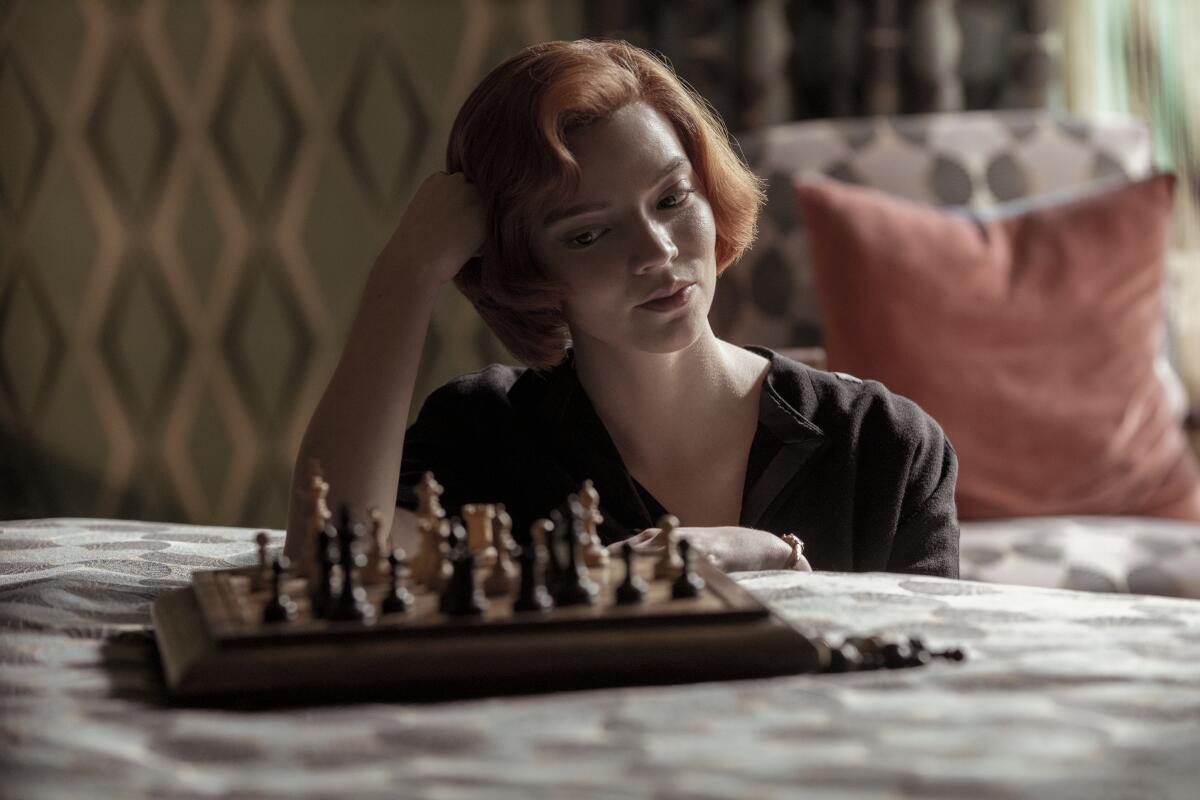Chess grandmaster sues Netflix for ‘false,’ ‘grossly sexist’ line in ‘Queen’s Gambit’

- Share via
Georgian chess grandmaster Nona Gaprindashvili has waged an attack on Netflix over its allegedly defamatory portrayal of her in the Emmy-nominated series “The Queen’s Gambit.”
The streaming giant, however, insists Gaprindashvili’s “claim has no merit.”
On Thursday, Gaprindashvili sued Netflix for $5 million in California for allegedly “belittling” her achievements as the first woman in chess history to be named a grandmaster.
“The Queen’s Gambit” — which this year received a whopping 18 Emmy nominations, including a nod for limited series — stars Anya Taylor-Joy as an American chess prodigy who frequently and epically triumphs over her predominantly male competitors.
The lawsuit focuses on a specific scene from “The Queen’s Gambit,” in which a commentator name-checks Gaprindashvili while narrating a match between protagonist Beth Harmon and fictional Russian Grandmaster Viktor Laev at the Moscow Invitational tournament in the series finale.
The Netflix series traces a chess prodigy’s journey toward self-acceptance through chess matches—and also shoes, frocks, curtains, jets, hotels and wallpaper, so much glorious wallpaper.
“Elizabeth Harmon’s not at all an important player by their standards,” the commentator remarks in the show.
“The only unusual thing about her, really, is her sex. And even that’s not unique in Russia. There’s Nona Gaprindashvili, but she’s the female world champion and has never faced men. My guess is Laev was expecting an easy win, and not at all the 27-move thrashing Beth Harmon just gave him.”
According to Gaprindashvili’s complaint, the assertion that the real-life chess champion “never faced men” is “manifestly false, as well as being grossly sexist and belittling.”
The lawsuit states that Gaprindashvili “had competed against at least 59 male chess players (28 of them simultaneously in one game), including at least ten Grandmasters of that time,” by 1968 — the year in which the final episode of “The Queen’s Gambit” takes place.
“The Queen’s Gambit,” about a female chess prodigy (Anya Taylor-Joy), is exciting, entertaining and convincing — especially when it comes to the game itself.
The chess legend is suing the streaming platform for false light invasion of privacy and defamation per se “arising from a knowingly false statement of fact made about” her in the Netflix drama.
“Netflix has only the utmost respect for Ms. Gaprindashvili and her illustrious career,” the streamer said in a statement provided Friday to the Los Angeles Times, “but we believe this claim has no merit and will vigorously defend the case.”
Gaprindashvili has also accused Netflix, in addition to allegedly disparaging her legacy, of incorrectly claiming that she is Russian when she identifies as Georgian. In the past, Gaprindashvili has represented both the Soviet Union and Georgia in competition.
“Piling on additional insult to injury, Netflix described Gaprindashvili as Russian, despite knowing that she was Georgian, and that Georgians had suffered under Russian domination when part of the Soviet Union, and had been bullied and invaded by Russia thereafter,” the lawsuit reads.
Anya Taylor-Joy is keeping busy with back-to-back projects — for the next two and a half years — including the “Mad Max: Fury Road” prequel, “Furiosa” from George Miller.
Gaprindashvili is seeking a checkmate against Netflix in the form of $5 million and an agreement that the streamer will “remove the statement that Gaprindashvili never played men from the Series.”
“Netflix brazenly and deliberately lied about Gaprindashvili’s achievements for the cheap and cynical purpose of ‘heightening the drama’ by making it appear that its fictional hero had managed to do what no other woman, including Gaprindashvili, had done,” the complaint says.
“Thus, in a story that was supposed to inspire women by showing a young woman competing with men at the highest levels of world chess, Netflix humiliated the one real woman trail blazer who had actually faced and defeated men on the world stage in the same era.”
More to Read
The complete guide to home viewing
Get Screen Gab for everything about the TV shows and streaming movies everyone’s talking about.
You may occasionally receive promotional content from the Los Angeles Times.








